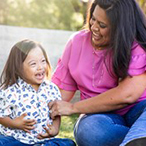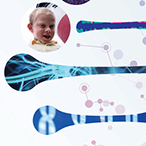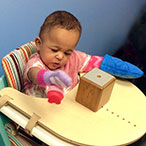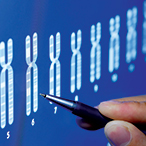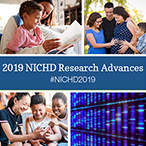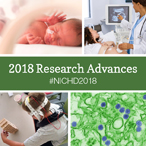The pandemic reinforces why the NIH INCLUDE (INvestigation of Co-occurring conditions across the Lifespan to Understand Down syndromE) Project matters to families and communities.
News
NICHD issues News Releases and Media Advisories to the news media. Spotlight and Research Feature articles explain NICHD research findings and public health issues to the general public. An Item of Interest is a short announcement of relevant information, such as a notable staff change.
Item of Interest: NIH Selects Centers to Advance Research on Fragile X Syndrome and Related Conditions
NIH announces funding for three centers for collaborative research on Fragile X syndrome, the most common inherited form of intellectual and developmental disability, and related conditions.
Director's Corner: Push to IMPROVE health outcomes for pregnant women
NIH has launched a new initiative that will combat the growing problem of maternal mortality and morbidity in the United States.
Item of Interest: NICHD Selects Six Infrastructure Centers to Promote Rehabilitation Research
The Eunice Kennedy Shriver National Institute of Child Health and Human Development recently selected six centers for its Medical Rehabilitation Research Resource Network.
Release: Autism risk estimated at 3 to 5% for children whose parents have a sibling with autism
Roughly 3 to 5% of children with an aunt or uncle with autism spectrum disorder (ASD) can also be expected to have ASD, compared to about 1.5% of children in the general population, according to a study funded by the National Institutes of Health. The findings call into question the female protective effect, a theory that females have a lower rate of ASD than males because they have greater tolerance of ASD risk factors.
Release: NIH-funded study links early sleep problems to autism diagnosis among at-risk children
A small study funded by the National Institutes of Health suggests that sleep problems among children who have a sibling with autism spectrum disorder (ASD) may further raise the likelihood of an ASD diagnosis, compared to at-risk children who do not have difficulty sleeping.
Media Advisory: Gene mutation enhances cognitive flexibility in mice, NIH study suggests
Researchers at the National Institutes of Health have discovered in mice what they believe is the first known genetic mutation to improve cognitive flexibility—the ability to adapt to changing situations.
Media Advisory: Researchers develop language test for people with Fragile X syndrome
Researchers have developed a test to measure the expressive language skills of people with Fragile X syndrome, a genetic disorder that may result in intellectual disability, cognitive impairment and symptoms of autism spectrum disorder. Expressive language refers to the use of words to convey meaning to others. The work was funded by the Eunice Kennedy Shriver National Institute of Child Health and Human Development, part of the National Institutes of Health.
Spotlight: A Decade of Human-Animal Interaction (HAI) Research
NICHD marks a 10-year partnership with WALTHAM® PetCare Science Institute, a division of Mars, to support research exploring the impact of interactions between animals and human companions.
Spotlight: Selected NICHD Research Advances of 2019
Read about NICHD’s notable research findings and activities from 2019.
Media Advisory: Severity of autism symptoms varies greatly among identical twins
Identical twins with autism spectrum disorder (ASD) often experience large differences in symptom severity even though they share the same DNA, according to an analysis funded by the National Institutes of Health. The findings suggest that identifying the causes of this variability may inform the treatment of ASD-related symptoms.
Media Advisory: NIH-funded study suggests acetaminophen exposure in pregnancy linked to higher risk of ADHD, autism
Exposure to acetaminophen in the womb may increase a child’s risk for attention deficit/hyperactivity disorder and autism spectrum disorder, suggests a study funded by the National Institutes of Health and the Agency for Health Care Research and Quality.
Science Update: Risk for autism spectrum disorder mainly influenced by genetics, suggests NICHD-funded study
Inherited genetic factors account for approximately 80 percent of the risk for autism spectrum disorder (ASD), according to estimates published in a study funded by NIH.
Item of Interest: Four NICHD Grantees Honored with PECASE Award
Four NICHD grantees will be honored July 25 in Washington, DC, with the Presidential Early Career Award for Scientists and Engineers. More than 300 researchers across the country are award recipients, the White House announced July 2.
Spotlight: NICHD Looks Back on 50 Years of Learning Disabilities Research
NICHD’s contributions to research on learning disabilities highlight decades of studies that informed the identification, recognition and treatment of these disorders.
Spotlight: How artificial intelligence and other new technologies are advancing healthcare
Scientists and engineers are pioneering new tools and methods to advance healthcare in revolutionary ways. Learn about emerging technologies funded by NICHD.
Spotlight: Harnessing light to study human development and the brain
NICHD’s Amir Gandjbakhche, Ph.D., leads a team that is pioneering the use of portable imaging technology to study human development and health conditions, including brain injuries and disorders.
Media Advisory: NICHD chronicles its major research advances of 2018
As 2018 winds down, a new slideshow highlights a selection of initiatives, therapies, and scientific advances supported by NIH’s Eunice Kennedy Shriver National Institute of Child Health and Human Development (NICHD).
Spotlight: Selected NICHD Research Advances of 2018
In 2018, researchers funded by NICHD made significant progress in advancing the health and well-being of infants, children, teenagers, and adults across the United States and around the world.
Science Update: Folic acid, multivitamins before and during pregnancy may reduce autism risk, suggests NIH-funded study
Children born to women who took either folic acid or a daily multivitamin before or during pregnancy were less likely to have a child diagnosed with an autism spectrum disorder, compared to children whose mothers did not take any prenatal vitamins, according to researchers funded in part by the National Institutes of Health.
 BACK TO TOP
BACK TO TOP
